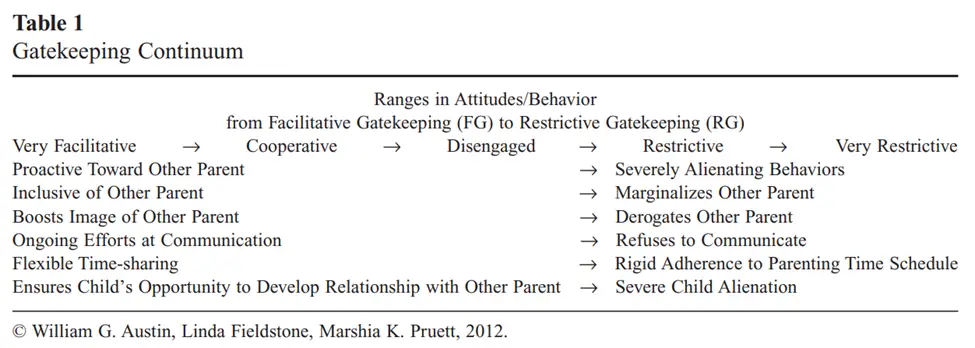Gatekeeping by Narcissistic Mothers
Gatekeeping is common in otherwise healthy families and even more common during separation and divorce. Mothers may weaponize gatekeeping during custody disputes. Yet, it is known that paternal involvement by both parents is necessary for optimal development of children.
Let’s review parental gatekeeping and talk specifically about how narcissistic mothers use it as a tactic.
Parental Gatekeeping
What is parental gatekeeping? Simply put, it is how one parent involves the other parent with the children. It is defined as “mother’s preferences and attempts to restrict and exclude fathers from child care and involvement with children.” There is a paucity of data demonstrating gatekeeping behaviors in men.
Gatekeeping can be positive (facilitative gatekeeping) to negative (inhibitory or restrictive gatekeeping) and is best seen in a spectrum.

Above, in Table 1, you can see the range of attitudes or behaviors goes from facilitative to cooperative, to disengaged, then restrictive. The behaviors or attitudes on the left are facilitative, and on the right are restrictive or inhibitory.
Gatekeeping was first described in women in the 50s, where gender stereotypes were normative.
Gatekeeping is common in custody disputes. Data demonstrates that mothers commonly control fathers through children. Since narcissistic mothers desire to control everything, they weaponize gatekeeping to punish the father.
Gatekeeping and Narcissism
Narcissistic mothers view their children as objects, items that reflect their glory. Unconsciously, they use their children to get what they want (just like they use other people). A lack of empathy means that they have the right to control, manipulate, and use their children to control, abuse, or hurt their father.
Co-parenting is difficult in divorce. In the short term, gatekeeping behaviors are common. With a narcissist, gatekeeping behaviors only stop once you stop being a source of narcissistic supply.
Gatekeeping allows a mother high in narcissistic traits or control to divide and conquer—by either co-opting her husband into accepting her authority or effectively banishing him from the arena so she’s free to rule the roost as she sees fit. Often, she’ll extend her gatekeeping to her children, orchestrating not just every child’s behaviors, but also their relationships to each other. Source
Approximately 20% of mothers in intact families are restrictive gatekeepers, and 40% of mothers, when co-parenting, showed an intermediate level of gatekeeping. If the father is viewed as competent, the rate of restrictive gatekeeping goes down. There is extremely sparse data on paternal gatekeeping, but it probably happens (especially if the father is a narcissist). Restrictive gatekeeping (or even the perception of it) is a large source of conflict when divorcing a narcissist.
It is important to distinguish between gatekeeping attitudes and behaviors. Restrictive attitudes will lead to “gate-closing behaviors,” and facilitative attitudes to “gate-opening behaviors.”
Examples of gate-closing (restrictive gatekeeping) behaviors:
- Being late to exchanges
- Open hostility
- Limiting contact by phone or text
- Derogatory comments about ex-spouse
- Lack of flexibility regarding the schedule
- Withholding information about the children
- Micromanaging the child’s time when with the father
Conclusion
When dealing with a narcissistic mother, it is important to distinguish between gatekeeping attitudes and behaviors. The gatekeeping attitude stems from the sense of superiority and splitting and can be seen as the equivalent of a fixed delusion in someone with narcissistic personality disorder. Gatekeeping behavior can be via proxy (flying monkeys) or subtler (say, via dog-whistling). It is yet another version of post-separation abuse by proxy.
Gatekeeping behavior by a narcissistic mother is any act to restrict or exclude fathers from child care and involvement with children.
Unfortunately, when dealing with a narcissist, the gatekeeping is unlikely to be short-term due to divorce-related stress; rather, the gatekeeping behaviors are likely to become entrenched and an enduring pattern of the parenting relationship. Parallel parenting is the most effective way to prevent ongoing abuse from the narcissistic mother.